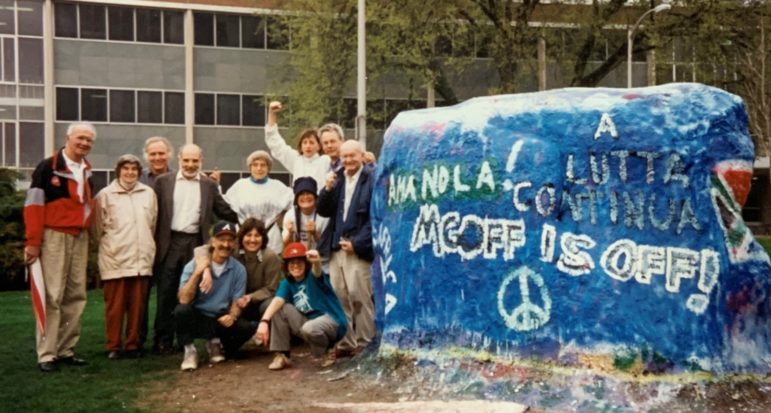
PEC Archives
Members of the Peace Council pose at the MSU rock outside of Bessey Hall in 1984. They painted the rock to celebrate their Southern Africa Liberation Committee’s success in removing John McGoff’s name from the Wharton Center after he was caught promoting apartheid.
After several decades of activism on MSU campus and in the capital, East Lansing’s Peace Education Center is planning to publish a book about the organization’s history. Board members are planning a spring reunion.
Center Co-Chair Rebecca Payne came up with the idea for a reunion after struggling to gather submissions. Payne and others have been reaching out to retired members since August to collect stories of past protests, causes and events sponsored by the Peace Education Center with lackluster results.
“People just aren’t writers … a lot of these people are really old now, so it might take a visit to their house where you can look them in the eye and talk to them face to face,” explained Payne.
Payne has received various submissions of photos, newspaper clippings and even books of poetry, but not the personal accounts she was hoping for.
So far, she does not have the material to reflect the rich history of the organization. Members hope the reunion will inspire past members to gather and reminisce in a productive way.
Payne’s vision for the book is still in the works, but she hopes it will highlight the center’s endless fight.
In 1969, the group was originally formed as the Peace Council. Focusing heavily on issues of anti-violence and the Vietnam War, the group met in various places, including a rented house in Lansing, before being relocated to its current office in the basement of the United Methodist Church on Harrison Road.
From the beginning, Peace Education Center members have actively supported progressive ideas regarding foreign policy, immigration, climate change and much more.
“We try to stay focused on war, but we branch out to all kinds of other things as well,” Payne said.
Payne said Judy Harris, an employee of Saint Vincent Catholic Charities, will speak this year on immigration.
However, the organization’s roots still lie in military protest.
During the 1960s and ’70s , Michigan State University supported the Vietnam War. To combat that, Peace Council members educated high school students about the reality of enlisting.
“Over the years there’s been various kinds of backlash,” said Payne.
When volunteers were turned away from schools, questioned, or doubted, they fought back. They had no problem dealing with opposition and knew they had the same rights as military groups to speak and hand out literature.
The group was very active when, under President George Bush, the United States invaded Iraq. In the early years of the Iraq War, members protested and informed the public, just as they did for Vietnam.
Today, the Peace Education Center still sees the U.S. military as an obstacle in the road to a more peaceful, eco-friendly society.
“The U.S. military is the biggest user of fossil fuels and biggest polluter in the world,” Payne said.
Although most of the 12-person board has been around since the beginning, new members with similar values are still joining.
Nate Jemison, a Lansing native who joined the center last year, said ending war and climate change are today’s most important issues.
Gabby Kindig, a junior at MSU, was nominated to the board after winning the Peace Education Center’s annual scholarship competition as a high school senior. She attended the group’s annual meeting to receive the Tom Schneider Peacemaker Award and knew instantly that she wanted to get involved.
“I’m really excited to be a part of this project,” Kindig said.